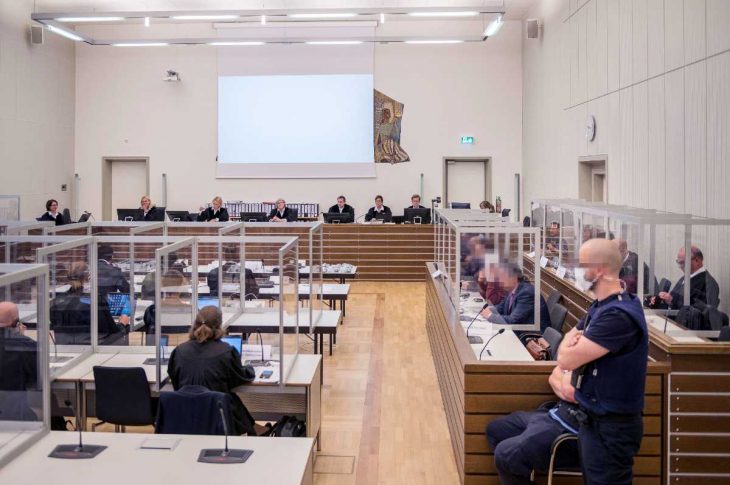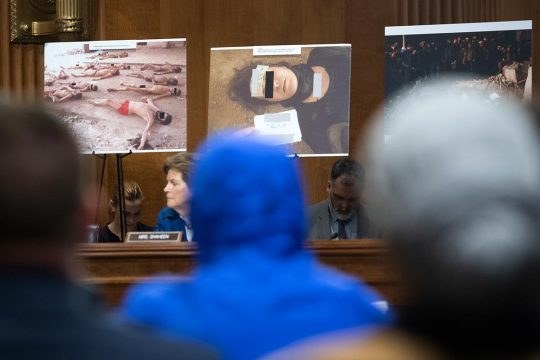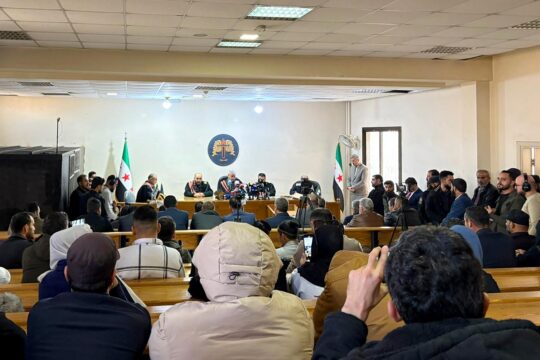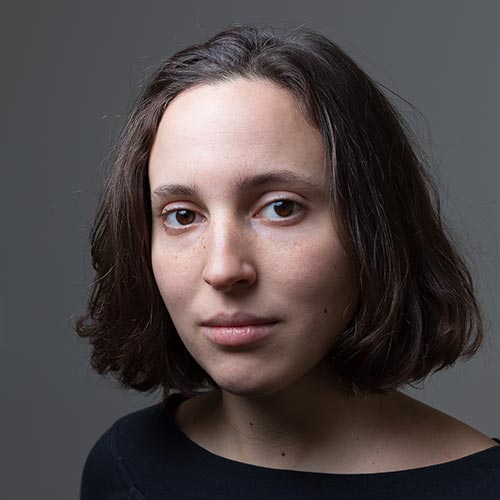To questions from the judges, he answers trembling. M.A. has been summoned by the court in Koblenz to talk about what he saw while working for the secret service in Syria: how cooling trucks dumped thousands of corpses into mass graves south of Damascus and how defendant Eyad Al-Gharib accompanied one of these deliveries. But a year after his interrogation with the German Federal Police (BKA), M.A. is not willing to repeat his accounts in court. Instead he gives vague, repetitive answers, retracting some of his earlier statements and clouding others to an extent that they become incomprehensible. Irritation grows inside the court room.
M.A. was the first insider witness to testify at Germany’s historic Al-Khatib trial on state torture in Syria. Another former secret service employee appeared in court a few days later. Both testified in open court and with no protection of their identities [however, Justice Info has decided to preserve them by giving them two initials]. They were working for the general secret service in Damascus in 2011 and 2012 when the crimes against humanity were allegedly committed: 58 killings, 4,000 cases of torture and two cases of rape or sexual assault. Both insider witnesses have provided statements to the police that could potentially incriminate the two defendants Anwar Raslan and Eyad Al-Gharib.
“The least you can do is support us” (prosecutor)
The German proceedings are oral, and only the testimony before the court is authoritative. M.A., a 30-year-old Syrian used to work for a military branch located near Najha cemetery, south of Damascus. A year ago, he told the police that he used to register the delivery of dead bodies on a regular basis: 8,400 corpses between April 2011 and January 2012, according to a list he once had to compile. One early morning, he had been assigned to meet a delivery convoy: two armed pick-up trucks and a cooling truck, headed for the mass graves and accompanied by Al-Gharib, he said during the police interrogation. The vanishing information dangles in front of federal prosecutor Jasper Klinge in the form of two police interrogation reports. He keeps quoting them, but the witness refuses to confirm or repeat what he said back then. When Klinge finally intervenes, he reminds the witness that giving false testimony is a criminal offence and warns him: “We are trying to clear up injustice that your family has fled from. As a witness who has come to a constitutional state it is the least you can do to support us.”
This is a dilemma for the witness. A few months ago, when the federal police approached him again for a third interrogation, he told them he would not say any more. According to a police report quoted by the Koblenz judges in court, the witness explained to the police officers that his family and Al-Gharib’s family were both living in the Turkish city of Urfa, near the Syrian border and that the defendant’s family members had threatened his. They were both from the same town in Syria and knew each other. When a judge mentioned this incident in court, the witness was again unwilling to confirm ever having said that. M.A. insists that there had been a misunderstanding and that the people who had threatened his family were unrelated to the defendant. Only after a prosecutor’s warning does he grudgingly confirm his earlier version of the events. It seems that the threats made him question his participation in the trial, but too late: according to the code of criminal procedures, witnesses are obliged to appear and testify in court, if summoned.
“Obligation to tell the truth” (judge)
The danger can also be a concern for anyone whose family members still live in Syria, as the case of the second insider witness showed. M.I. had been assigned to Branch 251 during his military service, between 2010 and his defection in 2012. During his court hearing at the beginning of July, the 37-year-old civil engineer talked about the courtyard of the branch, where he was posted to guard the buildings, or passed through on his way to the dormitory and cafeteria. He witnessed prisoners arriving in buses and being beaten, sometimes for hours, until they were taken to the underground prison; he heard the screams of those incarcerated through tiny windows facing from the prison towards the courtyard. At the beginning of his testimony, the witness addressed the judges: “I worry about my family in Syria. My mother and brother still live there and something could happen to them.” But judge Anne Kerber’s answer was curt: “That does not absolve you of your obligation to tell the truth.”
Two witnesses worried about their relatives but nonetheless obliged to testify – could such a situation have been avoided? Many witnesses were referred to the BKA due to what they said during their asylum hearings. They may have thought at the time that their cooperation with the police would have a positive influence on their asylum cases. They may also, after just arriving in Germany as refugees, not have grasped the full dimension of a potential trial and the attention it would receive. Witnesses are informed before giving their statement to the police that testimonies in a German court are generally public, BKA press officer Barbara Hübner told Justice Info. But the two insider witnesses did not seem to have been informed on what they were getting themselves and their families into when they first gave their statements to the BKA.
Sole possible protection: witness anonymity
Germany’s criminal procedure code would however have allowed them to testify anonymously, if “there is well-founded reason to fear that revealing the identity or the place of residence or whereabouts of the witness would endanger the witness’s or another person’s life, limb or liberty”. It also states that a witness shall be advised about this possibility if there are sufficient indications for such danger. “When a life is at stake, the bar for what counts as a potential danger should not be set too high,” says Markus Schmitt, press officer of the Chief Federal Prosecutor (GBA), who adds he doesn’t want to comment on an ongoing procedure.
Still, there is probably not a single Syrian witness in this trial who does not have family members outside of Germany, many still in Syria. The only protection the German judiciary can offer their families is keeping the witnesses anonymous. However, in the upcoming months, several Syrians will testify without stating their name and address, some even concealing their faces, sources close to the court told Justice Info. “Establishing the truth is the highest principle of judicial work, but it must not be established at any cost,” says Schmitt of the GBA’s office. “The witness’s interests have to be taken into account.”








